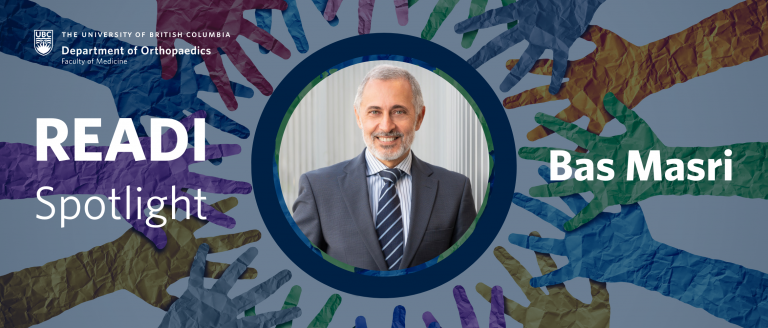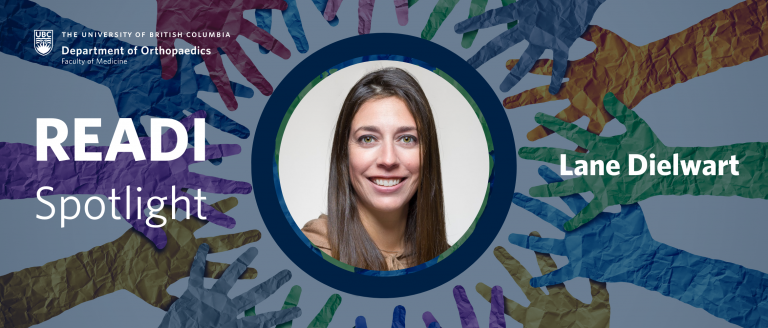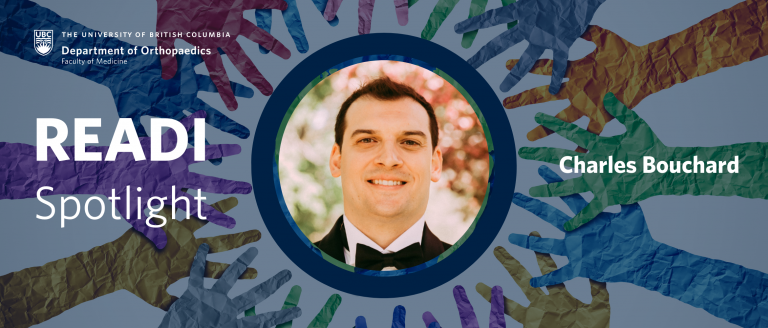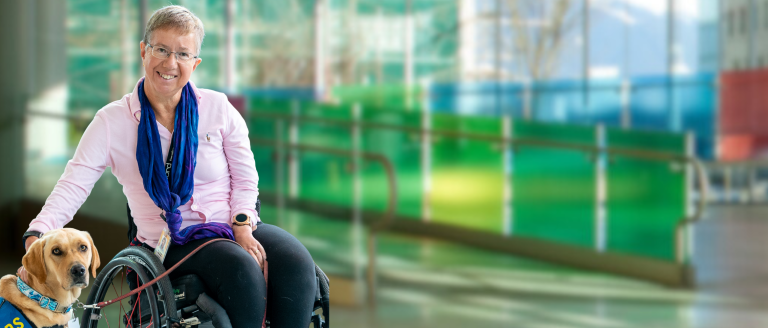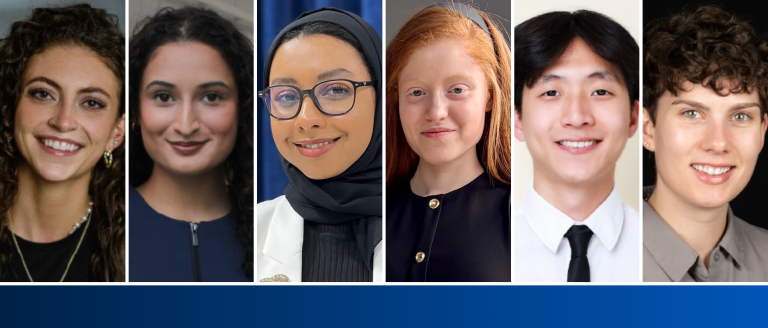By Olatioluwase (Ola) Olatona
As we kick off 2023, we will be featuring a bi-monthly interview with a UBC Department of Orthopaedics member about how respect, equity, accessibility, diversity, and inclusion (READI) appears in their life.
In our first READI spotlight of the year, we speak with UBC Orthopaedics Faculty Member, Dr. Fay Leung.
Read our previous interviews with Professor Emeritus Dr. Stephen Tredwell, Clinical Fellow Judith Nassaazi, and Clinical Professor Shafique Pirani.
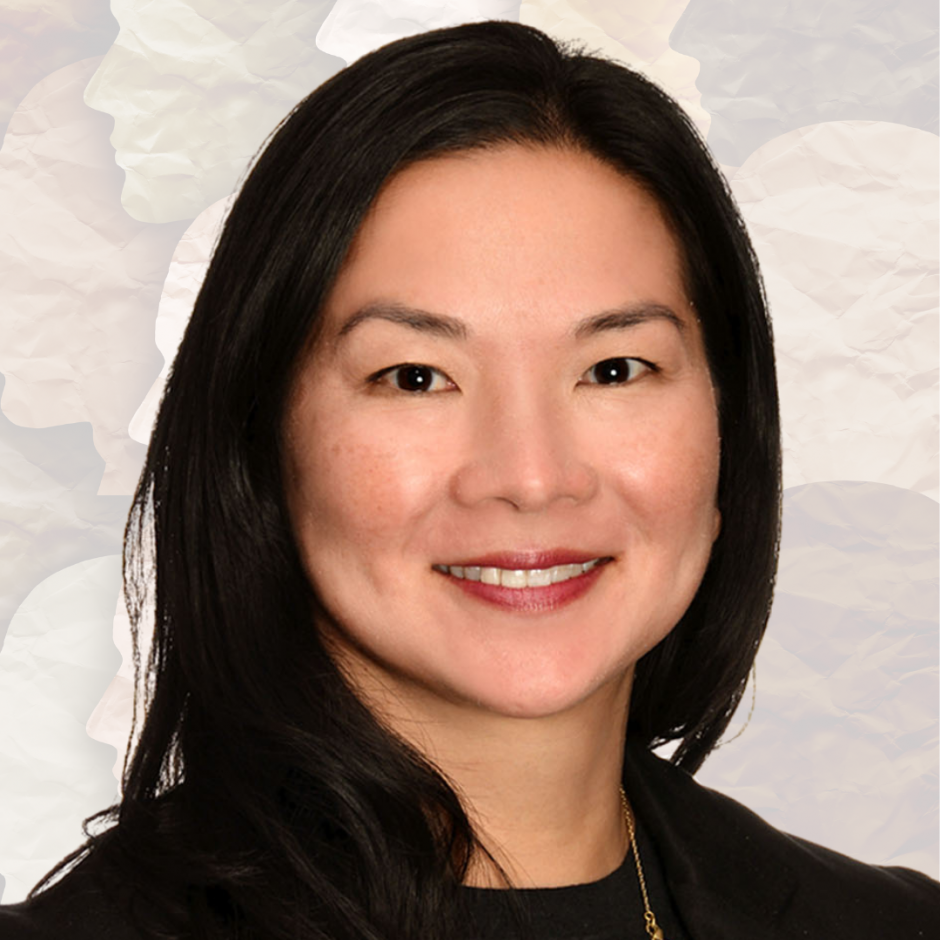
FAY LEUNG
Orthopedic Surgeon, Clinical Associate Professor & Associate Head of Education
Site:
Vancouver
Tell us about your background and interest in orthopaedics.
I grew up in Kamloops in the ’80s. My family was one of the few ethnic families in a very small working town at the time. This framed a lot of my experiences growing up as we were very Asian at home but quite the opposite when we stepped out of our home. At that time ethnicity, diversity and inclusion weren’t often thought of. We just assumed that we were just weird, and it led my sisters and me to try to normalize ourselves. My sister eventually went on to become a journalist and wrote an article titled I’ve always been a nose-to-tail eater which detailed how we hid a lot of our eating habits from our friends and family. With parents that arrived in Canada as immigrants, turkey dinners and Wonder bread sandwiches weren’t staples in our home; rather, we had meals like wontons and other Asian delicacies that friends at school and teachers would often marvel at. We grew up very much trying to hide ourselves out in public but in our home, we grew up with a very rich Asian culture, relishing in our history and the amazing meals that came out of it. There had always been a dichotomy in what we try to achieve on the outside vs. what’s happening on the inside. From a media perspective, I think it’s very interesting to talk about this because the world has moved on but there is still always that feeling of wanting to fit in and be proactive and accepted regardless of our backgrounds and in-home experiences.
What led you to pursue a career in orthopaedics?
My dad was a family doctor, so I had always been interested in medicine. Sports weren’t really endorsed by my family growing up so when I graduated, I started playing different sports until I got injured. I ended up in physiotherapy for a period of time and was still quite interested in what medicine had to offer. I found that I had a large interest in musculoskeletal health as I spent a lot of time with rugby physiotherapists.
I played rugby at UBC and a couple of other clubs and with my interest in physical therapy, I ended up helping with the varsity teams at UBC as well as provincial teams and the national team that one of my coaches was involved with. Through that connection, I knew a lot of the sports medicine people at UBC so when I got into medicine, I was really interested in becoming a sports medicine doctor which was when I was connected to Rob Lloyd-Smith and Bob Hawkins who eventually picked me up and mentioned if I want to go into medicine, orthopaedics would be the way to go and that’s how I ended up here.
What role did mentorship play in your orthopaedics journey?
The mentoring process was really important for me. And as I said before, Dr. Hawkins was my mentor as I went through medical school and into orthopaedics. Along the way, I developed many other mentors that are still with me today. The whole concept of evolving and growing never stops. I connect frequently with one of my mentors Patrick Chin, who is also a dear friend, about some of the experiences that we are going through professionally in healthcare and also personally as we have children that are roughly the same age. There is definitely an intersection between professional and personal goals and how we manage our families and things in between. I often wonder if part of our connection comes from a similar background as Asians in regard to culture. While Pat and I share similarities, we also have differences, and what makes him a good mentor for me is that he’s very respectful of our differences and helps me find my own way.
Once in a while, we see mentors who would like their mentees to emulate them but it’s very important to emphasize that every individual has their own path and journey. Mentors have a specific role in helping us own our individual values and beliefs and to find our own definition of success.
What does READI mean to you?
I think that we all have different backgrounds and REDI to me means being interested and curious about the different backgrounds and histories and what different individuals bring to the table. This also includes having an openness to try to explore how we can help each other to improve and become more inclusive. As I reflect on how I grew up and whether I would have liked things to be different, I think that I spent a lot of time battling and hiding different parts of myself. EDI now allows us to explore these different parts of ourselves and use those differences to our advantage, ultimately making our cultures richer.
In orthopaedics, we also have a culture and as I talked about at Ortho Update, a lot of what we consider to be learning in orthopaedics is about learning about the culture and in some ways, it’s about assimilating orthopaedics to include different backgrounds. EDI in orthopaedics really means that we learn all of the practical aspects of orthopaedics while bringing individual touches to what we do.
What role do you see yourself playing in improving READI in orthopaedics and the healthcare setting?
This is a great question! One of my reasons for being so interested in education is to encourage people to think about things a little differently. I recently had a conversation with one of my colleagues about we all work differently and how it is difficult for people to sometimes grasp the concept that other individuals might want to work differently than they do, and still be productive and successful. The pertinent discussion there for example was about subtle changes to work structure that could improve the physician experience as well as the patient experience. One of the things that I want to work on or think about is to carefully consider what our goals are as orthopaedic surgeons and how we can evolve to a place where we can accept differences in the way we practice, approach problems, and be a team while still achieving a high level of success.
When you’re not working, where can we find you?
I’m either working out at the gym or spending time with my kids. We love biking, skiing, hiking and exploring the area around my cabin in Black Tusk Village – the area provides lots of nature and space to enjoy the outdoors.
